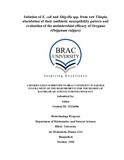Isolation of E. coli and Shigella spp. from raw Tilapia, elucidation of their antibiotic susceptibility pattern and evaluation of the antimicrobial efficacy of Oregano (Origanum vulgare)

View/
Date
2018-10Publisher
BRAC UniversityAuthor
Hossain, Dr. M. Mahboob
Department of Mathematics and Natural Sciences, BRAC University
Metadata
Show full item recordAbstract
Tilapia (Oreochromis spp.) has become the third most important fish in aquaculture because of their protein content, larger size and rapid growth to harvest. Due to improper handling and poor hygiene, fresh marketed raw fishes are becoming a potential reservoir of antibiotic-resistant bacteria. For this study, 28 tilapia fish samples from different markets of Dhaka city were investigated for the presence of E.coli and Shigella spp. Different organs such as skin, gill, intestine, and muscle were investigated from which it was revealed that maximum E. coli were isolated from gills (44%), whereas, Shigella spp. were isolated maximum from skin (36%) and intestine (36%). Out of 28 tilapia fish samples, a total of 25 E. coli isolates and 11 Shigella spp. isolates were identified. Nine groups of antibiotics were chosen: Beta-Lactam, Aminoglycoside, Lincosamide, Macrolide, Nitroimidazole, Quinolone, Sulfonamide, Chloramphenicol, and Tetracycline to study antibiotic-resistant pattern of the isolated bacteria. Antibiotic susceptibility test results of both the types of isolates showed that all the isolates were sensitive to Streptomycin, Levofloxacin, Ciprofloxacin, Imipenem, Kanamycin, Amikacin, and Norfloxacin. However, all of the 25 E. coli isolates were resistant to Oxacillin, Penicillin, Erythromycin, Clindamycin, Cephalexin, Amoxycillin and Metronidazole, and all of the 11 Shigella spp. isolates were resistant to Oxacillin, Ampicillin, Ceftazidime, Ceftriaxone, Co-Trimoxazole, Penicillin, Erythromycin, Clindamycin, Cephalexin, Amoxycillin, Azithromycin, Cefixime and Metronidazole. These are some common antibiotics used in day-to-day life. As plants are considered a new source of antimicrobial agents, the antibacterial property of Oregano (Origanum vulgare) was evaluated against the isolates. Among methanolic, ethanolic and aqueous extract, methanolic extract of oregano in 100% DMSO showed the best results for both E. coli and Shigella spp. isolates. An isolate of Shigella spp. isolated from the skin of a fish sample gave a high average zone of inhibition (19 mm) and the highest Activity Index (AI) for methanolic extract of oregano in 100% DMSO. Therefore, the Minimum Inhibitory Concentration (MIC) and Minimum Bactericidal Concentration (MBC) of this isolate were measured. MIC was found to be 160 μg/ml and MBC was 165 μg/ml.
